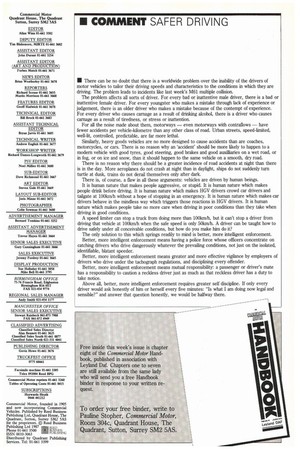• There can be no doubt that there is a
Page 5

If you've noticed an error in this article please click here to report it so we can fix it.
worldwide problem over the inability of the drivers of motor vehicles to tailor their driving speeds and characteristics to the conditions in which they are driving. The problem leads to incidents like last week's M61 multiple collision.
The problem affects all sorts of driver. For every bad or inattentive male driver, there is a bad or inattentive female driver. For every youngster who makes a mistake through lack of experience or judgement, there is an older driver who makes a mistake because of the contempt of experience. For every driver who causes carnage as a result of drinking alcohol, there is a driver who causes carnage as a result of tiredness, or stress or inattention.
For all the noise made about them, motorways — even motorways with contraflows — have fewer accidents per vehicle-kilometre than any other class of road. Urban streets, speed-limited, well-lit, controlled, predictable, are far more lethal.
Similarly, heavy goods vehicles are no more designed to cause accidents than are coaches, motorcycles, or cars_ There is no reason why an 'accident' should be more likely to happen to a modern vehicle with good tyres, good steering, good brakes and good auxiliaries on a wet road, or in fog, or on ice and snow, than it should happen to the same vehicle on a smooth, dry road.
There is no reason why there should be a greater incidence of road accidents at night than there is in the day. More aeroplanes do not crash at night than in daylight, ships do not suddenly turn turtle at dusk, trains do not derail themselves only after dark.
There is, of course, a flaw in all these arguments: vehicles are driven by human beings.
It is human nature that makes people aggressive, or stupid. It is human nature which makes people drink before driving. It is human nature which makes HGV drivers crowd car drivers and tailgate at 100km/h without a hope of stopping in an emergency. It is human nature which makes car drivers behave in the mindless way which triggers those reactions in HGV drivers. It is human nature which makes people take no more care when driving in poor conditions than they take when driving in good conditions.
A speed limiter can stop a truck from doing more than 100Iun/h, but it can't stop a driver from driving that vehicle at 100Iunfh when the safe speed is only 50km/h. A driver can be taught how to drive safely under all conceivable conditions, but how do you make him do it?
The only solution to this which springs readily to mind is better, more intelligent enforcement.
Better, more intelligent enforcement means having a police force whose officers concentrate on catching drivers who drive dangerously whatever the prevailing conditions, not just on the isolated, identifiable, blatant speeder.
Better, more intelligent enforcement means greater and more effective vigilance by employers of drivers who drive under the tachograph regulations, and disciplining every offender.
Better, more intelligent enforcement means mutual responsibility: a passenger or driver's mate has a responsibility to caution a reckless driver just as much as that reckless driver has a duty to take notice.
Above all, better, more intelligent enforcement requires greater self discipline. If only every driver would ask honestly of him or herself every five minutes: "Is what I am doing now legal and sensible?" and answer that question honestly, we would be halfway there.








































































































